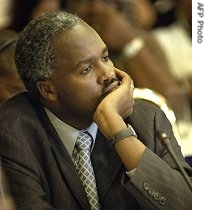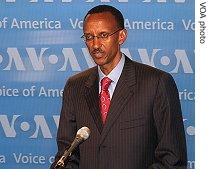-
(单词翻译:双击或拖选)
Nairobi
05 July 2007
Rwanda's foreign minister says France is refusing to try former officials on charges that they may have been complicit in the 1994 genocide because it does not want them to be associated with such a crime. Nick Wadhams reports from our East Africa bureau in Nairobi.
 |
| Charles Murigande (2004 file photo) |
"You know, genocide is the worst crime that can be committed on this Earth and there is no person and no country which would associate itself with genocide," he said. "I can understand France trying to deny involvement whatsoever2 in the genocide. All those criminals that are being tried for genocide in all these international courts, every one of them denies participation3 because it is something that is horrible, nobody would willingly accept responsibility."
The foreign minister's remarks come three days after the French newspaper Le Monde reported that French officials had clear warnings in the early 1990s of a possible slaughter4 by ethnic5 Hutus of the minority Tutsis. The newspaper says French officials backed the Hutu-led government nonetheless.
On Tuesday, Rwanda's justice minister said France should prosecute6 politicians who ignored warnings about the genocide.
France's Foreign Ministry7 refused comment on Murigande's remarks, but France has long denied any complicity in the genocide.
Nearly 800,000 people are believed to have been killed in 100 days of violence by Hutu extremists, who slaughtered8 members of the Tutsi minority and also moderate Hutus who did not support the extremists.
Rwanda also accuses France of refusing to cooperate with a commission of inquiry9 into the 1994 massacre. Murigande says he believes that France will eventually have to try former officials for their involvement.
"If France wants to hold to that image of a democratic and a law abiding10 country, it will eventually have to hold accountable those who played such a horrible role," he said.
 |
| Paul Kagame at VOA (file photo) |
President Kagame, a Tutsi, led the rebel group that eventually brought the genocide to an end.
 收听单词发音
收听单词发音
1
massacre

|
|
| n.残杀,大屠杀;v.残杀,集体屠杀 | |
参考例句: |
|
|
|
2
whatsoever

|
|
| adv.(用于否定句中以加强语气)任何;pron.无论什么 | |
参考例句: |
|
|
|
3
participation

|
|
| n.参与,参加,分享 | |
参考例句: |
|
|
|
4
slaughter

|
|
| n.屠杀,屠宰;vt.屠杀,宰杀 | |
参考例句: |
|
|
|
5
ethnic

|
|
| adj.人种的,种族的,异教徒的 | |
参考例句: |
|
|
|
6
prosecute

|
|
| vt.告发;进行;vi.告发,起诉,作检察官 | |
参考例句: |
|
|
|
7
ministry

|
|
| n.(政府的)部;牧师 | |
参考例句: |
|
|
|
8
slaughtered

|
|
| v.屠杀,杀戮,屠宰( slaughter的过去式和过去分词 ) | |
参考例句: |
|
|
|
9
inquiry

|
|
| n.打听,询问,调查,查问 | |
参考例句: |
|
|
|
10
abiding

|
|
| adj.永久的,持久的,不变的 | |
参考例句: |
|
|
|
11
assassination

|
|
| n.暗杀;暗杀事件 | |
参考例句: |
|
|
|
12
predecessor

|
|
| n.前辈,前任 | |
参考例句: |
|
|
|















